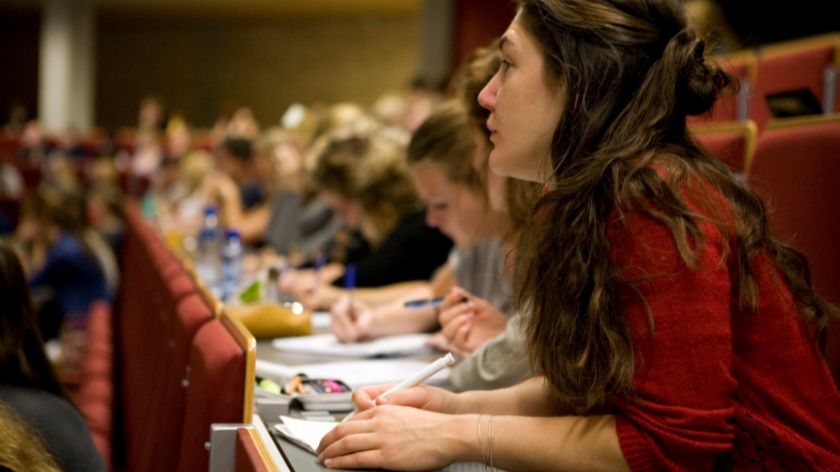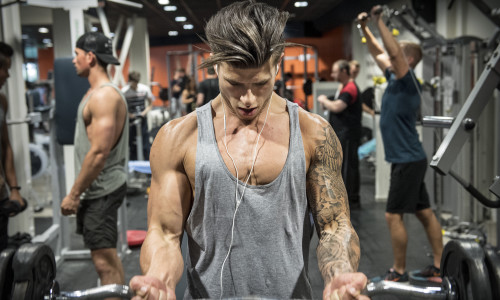University offers ‘tailor-made solutions’ for teachers who are worried about reopening offline education
-
 Foto: Anoek Bleumer
Foto: Anoek Bleumer
After a year and a half of online education, the lecture halls will reopen completely. Some teachers have mixed feelings, because of their worries about the risk of infection and the pressures the maximum group sizes entail.
Last week, Matt Cornell announced that he is going to quit his job as a Literary Sciences teacher at the University of Amsterdam (UvA) via an opinion piece in the university magazine Folia. He finds it irresponsible that universities will let go of the 1.5-meter rule without the enforcement of a vaccination mandate for students.
Minister Van Engelshoven of higher education decided in mid-August that the social distancing rule would no longer be mandatory at universities, after a lobby of universities and students. Both the quality of education and student wellbeing suffered greatly from a year and a half of (primarily) socially distant education.
The minister, too, found that physical education could be organized responsibly again, since everyone can get vaccinated, and the infection rates have declined. Nevertheless, a maximum group size of 75 people applies, masks are still mandatory when walking in indoor spaces, and students are expected to do a self-test twice a week.
Unvaccinated students
Many universities, students and staff think that it is great news that physical education is possible again. However, there is a group of teachers who, like the UvA-teacher Cornell, worry about the reopening of physical education, also at Radboud University. They are concerned about the risks of infection when they, for example, teach in a packed lecture hall. ‘Is there an estimation of how many unvaccinated students we will have to teach?’, Vitória Piai, assistant professor at the Donders Institute, wonders on Twitter. ‘I am not looking forward to it to be honest.’
University spokesperson Martijn Gerritsen says that those vaccination percentages are unknown to the university. According to statistics from the National Institute for Public Health and the Environment (RIVM), sixty-five percent of 18 to 25 years olds had their first vaccination on the 22nd of August, a percentage that has barely changed in the last month and a half. Only 52 percent is fully vaccinated. ‘Maybe this is due to the vacations, maybe because they had less time, since they had to wait longer, RIVM modeller Jacco Wallinga told NOS. Research by Jacqueline Vink, professor of Developmental Psychopathology, recently showed that 88 percent of Radboud students plans to get vaccinated. It is hoped that additional measures, such as self-testing at home, are enough to keep corona out of the lecture halls.
Tailor-made solutions
Teachers who have reasons not to come to campus can make this known to their supervisors, says university spokesperson Gerritsen. ’We will look for tailor-made solutions where necessary.’ This can mean that a teacher will teach their classes completely online, even with groups smaller than 75, or that a colleague takes over the course.
‘We aren’t going to force anyone to teach offline’
‘We aren’t going to force anyone to teach offline’, says Nicolo de Groot, vice-dean of education at the Faculty of Science. He understands the concerns of teachers, even though there were few at his faculty, he says. ‘Now that the delta variant is here, we know you can be contagious, even if you’re fully vaccinated.’
Students aren’t required to be physically present either, the vice-dean emphasizes. ‘If we are strict in that regard, it could trigger someone to come to campus, even if they are infected. That is a recipe for disaster.’ That’s why students at the Faculty of Science can (re)watch lectures when they are in quarantine. And courses with seminars always provide at least one online seminar, according to De Groot.
Testing for Entry
Critics wonder why the minister hasn’t introduced a ‘testing for entry’ system to universities. This is permitted by law after all. Or why education couldn’t have taken place online until at least the 20th of September, which was the scientific advice of the Outbreak Management Team (but which wasn’t adopted by the government). Haven’t universities been emphasizing the importance of listening to science during the corona crisis?
This may be true, the Ministry of Education and universities argue, but one must try to keep higher education going, even in times of increasing rates of infection. The most recent guidelines of the Ministry state this is due to the societal importance of education. Asking for QR-codes at the entrance of every building then raises the threshold, aside from the fact that it’s hard to implement practically.
Measures might be stricter again
However, the Ministry also writes that ‘It is not unthinkable that measures will be stricter again in the fall of 2021’, such as the 1.5-meter rule or testing before entry. The Faculty of Science is prepared in any case. De Groot: ‘We will already keep 1.5 meters during practical classes next semester, as a precaution.’
Fear of a mounting workload
Apart from the fear of infection, there are also staff that worry the new rules will lead to a mounting workload. ‘I have to teach a group that is larger than the maximum of 75 in the first semester’, says Marijtje Jongsma, associate professor of Psychology. ‘I have to figure out all by myself how I’m going to do that.’
The absence of guidelines is partially due to the fact that the Ministry only gave the practical guidelines at the end of last week, according to the lecturer, who is also active in the education union AOb. That is less than a week and a half before the start of the academic year.
Her educational institute suggested hybrid lectures (simultaneously offline and online, ed.), in which students take turns in the lecture hall. Jongsma: ‘It costs extra time, which is why the workload increases even further. I understand the student lobby for offline education, that’s their prerogative, but the staff perspective gets overshadowed in my opinion.’
The temporary NPO resources partially mitigate the extra work, says vice-dean De Groot of FNWI. The state resources are meant to counteract corona delays in higher education. ‘With this, teachers at our faculty are able to hire student assistants who will take care of the online part of hybrid lectures.’ They make sure that everything is taken care of technically. They monitor questions asked to teachers in the chat, for example.
The AOb union has put out a survey to get an accurate view of how teachers view the reopening of education. The questionnaire is open to teachers at all higher education institutions, including universities.




